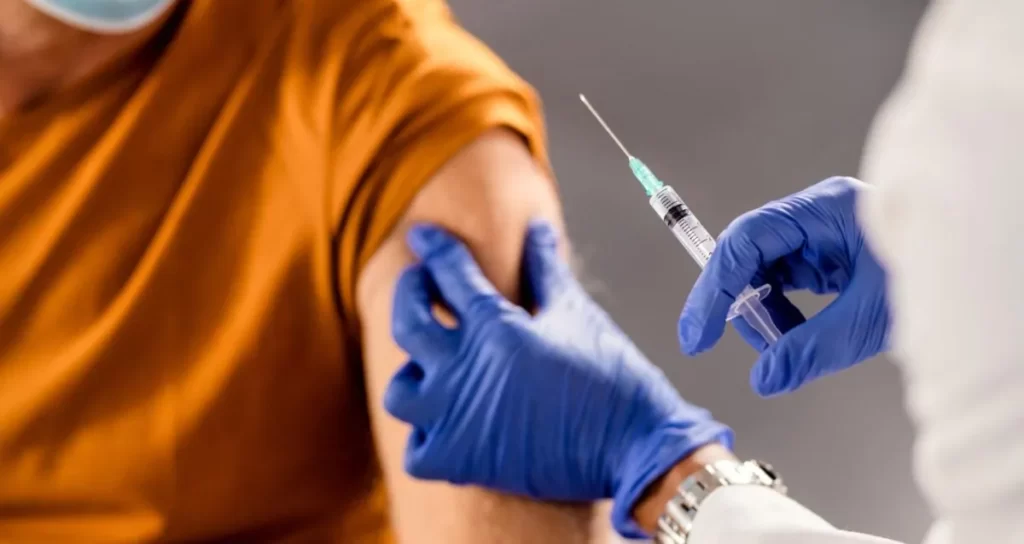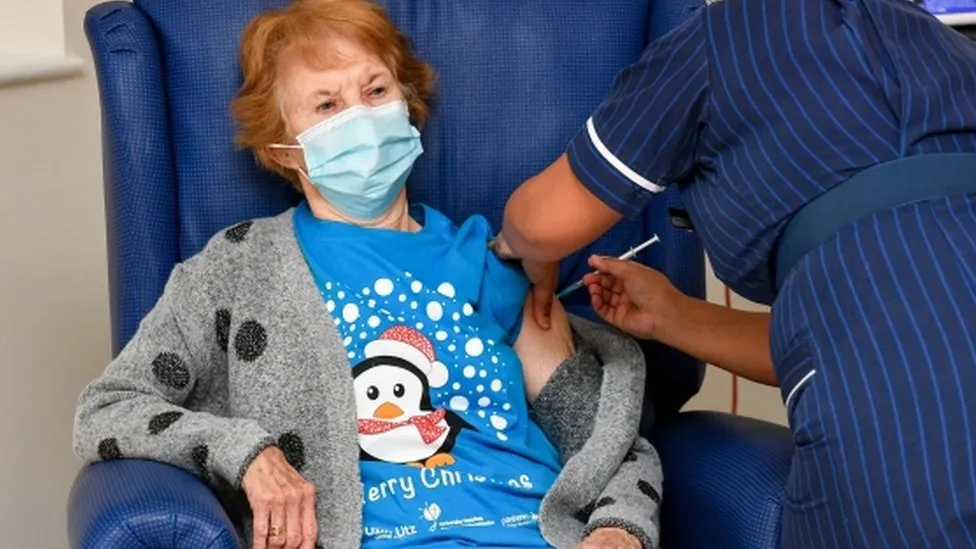Researchers from the UK say messenger ribonucleic acid (mRNA) technology in some Covid vaccines could be improved even further.

The Medical Research Council team suggested refining the genetic instructions in mRNA vaccines to prevent a small and harmless “slip” when the body interprets the genetic code. They emphasized the safety and efficacy of the mRNA vaccines produced by Pfizer-BioNTech and Moderna.
The research, partially funded by the government and published in the journal Nature, focused on detailed laboratory investigations of the original Pfizer-BioNTech mRNA vaccine, a pioneer in its category that was first used to protect people during a pandemic three years ago.
The study looked at mice and 21 volunteers who had received the Pfizer-BioNTech vaccine, revealing that one in three could experience the said slip defect during the vaccination process. While current mRNA vaccines, including Pfizer-BioNTech and the Moderna Shot, are being hailed as significant successes in medicine, researchers hope that fine-tuning the genetic code could make these vaccines even better.
Gut Health Mastery: A Comprehensive Guide to Healing Your Gut
Considered one of the breakthroughs in medicine, mRNA vaccines have played a vital role in saving millions of lives. Researchers emphasize that understanding and developing the science behind mRNA technology could help these vaccines combat a wide range of diseases, including potentially addressing conditions such as cancer.
The mechanism of action of covid mRNA vaccines is to present a snippet of the genetic code from the pandemic virus to the body’s cells. This genetic material does not cause infection but instructs the body how to protect itself from Covid-19. The body’s cell machinery, called ribosomes, reads and translates the genetic code. Subsequently, the immune system uses these cues to produce specialized protective proteins called antibodies that play a key role in fighting the COVID-19 virus.
What is mRNA?
mRNA stands for messenger RNA. It is a type of genetic material that plays a crucial role in the process of protein synthesis within cells. The central dogma of molecular biology describes the flow of genetic information as DNA is transcribed into mRNA, which is then translated into proteins.
Here’s a breakdown of the key aspects of mRNA:
- Role and Function: mRNA acts as a messenger, carrying genetic instructions from the DNA in the cell’s nucleus to the ribosomes, which are cellular structures responsible for protein synthesis.
- Transcription: The process begins with the transcription of a specific gene in the DNA. During transcription, an enzyme called RNA polymerase reads the DNA sequence and synthesizes a complementary mRNA strand.
- Codons: The mRNA strand consists of sequences of three nucleotides called codons. Each codon codes for a specific amino acid, the building blocks of proteins.
- Translation: The mRNA molecule then travels from the nucleus to the cytoplasm, where the ribosomes “read” the codons during a process called translation. Transfer RNA (tRNA) molecules bring the corresponding amino acids to the ribosome, allowing the assembly of a protein based on the mRNA sequence.
- Protein Synthesis: The sequence of codons in the mRNA determines the order in which amino acids are joined together to form a protein.
mRNA technology has been harnessed in the development of vaccines, particularly in the case of mRNA vaccines against diseases like Covid-19. In these vaccines, a small piece of mRNA with instructions for a viral protein is introduced into the body. The cells then use this mRNA to produce the viral protein, prompting an immune response that helps protect against future infections.
Skips Forward

The researchers highlighted that slight differences may occur during the translation process in ribosomes. Despite these minor differences, the overall result remains an excellent defense. However, in this process, some additional, unintended proteins may be produced.
Fortunately, based on real-life evidence from millions of people, including teenagers and children, who have received the vaccine, these unintended proteins cause no physical problems, the researchers confirmed. They stressed that any potential problems could be identified early in a widespread vaccination campaign.
To illustrate the translation process, it is compared to reading a three-syllable sentence such as “The cat ate the fat mouse.” Occasionally, the ribosome may move forward by a letter or position, a phenomenon known as a frameshift, resulting in a slightly altered sequence being read, such as “The cat a tet hef atr”.
Researchers have found that a simple tweak to some genetic code can eliminate these defects without affecting the intended outcome—protection from a dangerous disease. This insight suggests a promising way to improve mRNA vaccines to improve their accuracy and reliability in producing the desired immune response.
Slip-resistant Coding
Dr James Thaventhiran, a leading researcher attached to the MRC Toxicology Unit at the University of Cambridge, emphasized the clear safety of the mRNA vaccine against COVID-19 based on extensive research. Billions of mRNA vaccines, including those developed by Moderna and Pfizer, have been administered worldwide with a proven track record of safety, contributing significantly to saving lives.
Dr Taventhiran emphasized the importance of ensuring the reliability of future mRNA vaccines. The research team considers the development of “slip-resistant” mRNAs, as demonstrated in their study, to be a critical advance for the ongoing safety and efficacy of this medical platform.
Co-researcher Professor Anne Willis echoed the importance of this breakthrough, saying the technology behind mRNA vaccines is great and has the potential to revolutionize a new drug platform for a variety of applications beyond COVID-19. This emphasis on safety and reliability underscores the commitment to improving mRNA technology to maintain its status as an excellent and versatile tool in medicine.
‘Easy Fix’

Professor Stephen Griffin, an expert in cancer virology at the University of Leeds, hailed the study as a landmark achievement. He emphasized the importance of understanding the potential for these events to occur but emphasized that this does not cast doubt on the well-established population safety record of mRNA vaccines. Administered more than 13 billion times since 2021, these vaccines have demonstrated a strong safety profile.
Furthermore, Professor Griffin believes that now that this potential problem has been identified, there is a straightforward solution. The researchers propose incorporating slip-resistant coding into future mRNA vaccines to reduce the risk of unintended proteins triggering an unwanted immune response or side effect.
As with any treatment or vaccine, it is acknowledged that there may be possible risks or side effects, although not everyone will experience them. This measured approach emphasizes the importance of ongoing research and refinement in vaccine development to improve safety and efficacy while reassuring the public about the overall safety of mRNA vaccines.
Common side effects associated with Covid vaccines are usually mild and short-lived. These may include:
- Sore arm at the injection site
- Fatigue
- headache
- Aches and pains
In the United Kingdom, official data indicates that around 53 million people received their first dose of the COVID-19 vaccine, 50 million received a second dose and more than 40 million received a third dose or booster. It is important to note that the safety of these vaccines is constantly monitored.
The Medicines and Healthcare Products Regulatory Agency (MHRA), which is responsible for overseeing vaccine safety in the UK, has stressed that the benefits of vaccines in preventing COVID-19 and the associated serious complications far outweigh the currently known side effects for the majority of patients. This ongoing monitoring underscores the commitment to ensure the safety and effectiveness of COVID-19 vaccines throughout their widespread administration.

MHRA Chief Safety Officer Dr Alison Cave emphasized the importance of continuous review of emerging information regarding COVID-19 vaccines. She encourages people who suspect they have experienced a side effect linked to their COVID-19 vaccine to report it via the Yellow Card Scheme website.
In the UK, there have been rare cases of myocarditis, an inflammation of the heart muscle, following the administration of mRNA vaccines such as Moderna and Pfizer. This is classified as a very rare side effect.
It should be noted that the Oxford-AstraZeneca vaccine used in the early stages of the pandemic works slightly differently than mRNA vaccines. It has also been associated with rarely reported side effects, including cases where people develop dangerous blood clots.
The identification and monitoring of such rare side effects underscores the commitment of health authorities to ensuring the safety of COVID-19 vaccines and providing transparent information to the public. Reporting any suspected side effects through established channels, such as the Yellow Card scheme, contributes to the ongoing evaluation and refinement of vaccine safety protocols.
Pfizer Embraces Independent Research and Advances in mRNA Vaccines Technology
Pfizer has expressed a positive attitude toward independent research and academic discussions aimed at advancing mRNA technology. Recognizing the critical role of mRNA platforms during the COVID-19 pandemic, Pfizer said the global administration of hundreds of millions of doses of their COVID-19 vaccines has established a favorable benefit-risk profile.
The company reaffirms its commitment to advancing mRNA research, working with the scientific community to explore new applications for this promising platform. Pfizer’s announcement reflects a commitment to ongoing scientific exploration and innovation to further utilize mRNA technology for the prevention and treatment of a broad spectrum of human diseases.
Frequently Asked Questions:
Which vaccines have mRNA?
Both the Pfizer-BioNTech and Moderna COVID-19 vaccines utilize mRNA technology. The vector vaccine, on the other hand, involves incorporating material from the COVID-19 virus into a modified version of a different virus, known as a viral vector.
What is mRNA, and how does it relate to COVID-19 vaccines?
mRNA, or messenger RNA, is genetic material that plays a vital role in protein synthesis within cells. In the context of COVID-19 vaccines, both Pfizer-BioNTech and Moderna utilize mRNA to instruct cells to produce a viral protein, triggering an immune response for protection.
How do mRNA vaccines work in preventing COVID-19?
mRNA vaccines deliver a small piece of genetic code from the virus, allowing cells to produce a viral protein. This prompts the immune system to generate a protective response, preparing the body to defend against future infections.
How safe are mRNA vaccines, and what are their common side effects?
mRNA vaccines, including Pfizer-BioNTech and Moderna, have demonstrated a strong safety profile. Common side effects are generally mild and short-lived, such as a sore arm, fatigue, headache, and body aches.
What are the reported rare side effects associated with mRNA vaccines?
Rare side effects include cases of myocarditis (inflammation of the heart muscle), particularly following Moderna and Pfizer vaccines. These instances are categorized as very rare, and the benefits of vaccination far outweigh these risks.

